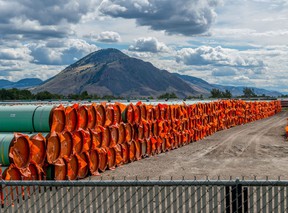
For all the talk about the ongoing energy transition, another change is taking place in Canada’s oilpatch.
Call it a leadership transition.
On Monday, Pembina Pipeline Corp. became the latest energy organization in the country to announce a major shift at the top of its ranks.
The Calgary-based midstream company said long-time chief executive officer Mick Dilger has stepped down to “pursue other opportunities.”
The country’s third-largest pipeline company named chief financial officer Scott Burrows as its interim CEO. In a news release, the company said it will work with a management search firm to evaluate internal and external candidates “to lead Pembina in its next chapter.”
Dilger’s departure comes as a spate of changes have unfolded at the top of industry groups and a number of energy companies in the past year.
The sector is also experiencing a rapid makeover, from the increased focus on energy transition plans and ESG concerns from investors to the impact of rising commodity prices and industry consolidation.
Reached Monday, Dilger declined to talk about his departure or what he will do next, but stressed there are plenty of opportunities ahead for the Canadian energy industry during this period of turbulence.
“It’s been a great run and I had a superb adventure and life is full of possibilities,” said Dilger, who served as Pembina’s CEO since 2014 and was previously the company’s chief operating officer.
“Oil has gone from zero dollars to headed up to $100 and the same (trend) with gas. Producing companies have gone from rags to riches and they will pay off all their debt.
“So the key question right now is: What is the tenure of hydrocarbon production? And I think it looks a lot like it’s four to five decades, rather than one to two decades.”

Pembina, with a market capitalization of $22 billion, has faced a hectic 2021, marked by an unsuccessful $8.3-billion takeover bid for Inter Pipeline Ltd. this summer. It lost out to a higher offer from Brookfield Infrastructure Partners.
In June, Pembina announced a partnership with the Haisla Nation to team up on the proposed $3-billion Cedar LNG Project near Kitimat, B.C. It joined forces with TC Energy Corp. on a proposed carbon transportation and sequestration initiative, called the Alberta Carbon Grid.
It also established a partnership this summer with the Western Indigenous Pipeline Group to seek ownership of the Trans Mountain Pipeline, which is owned by the federal government.
“They are reinventing themselves beyond pipelines,” said analyst Elias Foscolos of Industrial Alliance Securities.
“Pembina Pipeline might be just Pembina Corp. at some point and … there’s a fundamental shift that’s going on.”
Despite a state of flux in the sector, Dilger said the world is headed back to consuming 100 million barrels of oil a day.
“The inconvenient truth is that it’s still a superb source of energy and we will need all sources of energy, not just oil and gas. We will need renewables, we will need everything,” he added.
“Flux is one word. I would say it’s full of opportunities.”

News of his departure surprised players in the oilpatch and Pembina’s stock fell 2.7 per cent Monday to close at $40.50, although it’s still up by a third for the entire year. Earlier this month, the company posted third-quarter profits of $588 million.
Dilger’s departure is another major shift at a Calgary-based energy outfit in 2021.
Earlier this month, Canadian Association of Petroleum Producers president Tim McMillan said he will step down in April, while CES Energy Solutions announced last month that Ken Zinger has taken over the top spot from Tom Simons, who has retired.
The Petroleum Services Association of Canada named a new CEO, Gurpreet Lail, in June, while the Canadian Energy Pipeline Association — headed by Chris Bloomer — said in October it will wind down by year’s end.
These announcements followed other well-telegraphed corporate moves earlier in the year, such as Dean Setoguchi becoming the new CEO at Keyera Corp. on Jan. 1, while Francois Poirier took over as the chief executive at TC Energy.
The industry is going through as much change in 2021 as it has in a number of years, although there’s no single narrative that neatly explains all of these moves, said Michael Tims, vice-chair of Matco Investments.
“It is a whole bunch of different situations that are unfolding,” said Tims.
Yet, there are some common threads: the industry’s fortunes are shifting with higher prices, the energy transition is gaining momentum and the pandemic is dragging on.
At CAPP, McMillan pointed out he’s been on the job for seven years, making him only the second leader to remain at the group’s helm for that length of time.
“It feels like a good time for me to step away, personally. It’s right for me. But it’s also right for the industry, now that we’re back on solid footing,” McMillan said in a recent interview.
“It would have been very challenging to change leadership a year-and-a-half ago when the price of oil was negative.”

Bloomer said issues related to ESG, climate, Indigenous partnerships and diversity have all taken on greater focus for energy companies, leading to a “major pivot period.”
After dealing with the pandemic and oil-price collapse last year, many leaders are also tired, and a new skill set will be needed for the future.
“This is going to play out over a year or two, but this industry is on a path of significant and fundamental change going forward, because it’s a survival issue, it’s an economic issue,” Bloomer said.
“These things don’t happen without a reason. And it’s a matter of the whole industry trying to come to grips with the new landscape and survive and thrive.”
Chris Varcoe is a Calgary Herald columnist.
You can read more of the news on source
